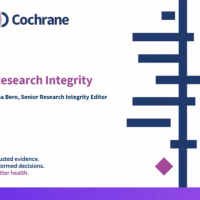
The Cochrane-REWARD prize recognizes successful local or pilot initiatives that have potential to reduce research waste globally if scaled up. Cochrane has funded the prize since it began in 2017. For this iteration of the prize, submissions related to tackling research waste relevant to COVID-19 were encouraged.
The prize ceremony took place on 1 March virtually (recordings are available below). Two representatives of the prize committee – Matt Westmore, Chief Executive of the UK Health Research Authority, and Lex Bouter, Professor of Methodology and Integrity at Vrije Universiteit Amsterdam – joined to announce the winners, who gave short presentations on their initiatives. Lisa Bero, Cochrane’s Senior Research Integrity Editor, also joined the session to give an update on Cochrane’s research integrity agenda.
2021 Cochrane-REWARD prize winners
This year was particularly competitive, with many very strong contenders for the prize committee to consider. Thank you to all who submitted nominations, and congratulations to the winners below
First prize: COVID-END
The COVID-19 Evidence Network to support Decision-making (COVID-END) was awarded first prize. Jeremy Grimshaw and John Lavis accepted the prize on behalf of the network.
COVID-END is a time-limited network of 58 global evidence synthesis, guidance and decision support partner organizations established to better coordinate the evidence synthesis response to the COVID-19 pandemic and reduce research waste.
Together with its partners, COVID-END has worked to reduce waste in all five stages of research. Selected highlights include:
- Setting up a global horizon scanning panel to proactively identify recurrent and emerging issues requiring evidence syntheses in the coming months.
- Developing interactive flow-diagrams for researchers and guideline developers planning to work on a new review or guideline pointing them to helpful resources, while encouraging them to ensure that they are not duplicating the efforts of another group.
- Creating an inventory of best evidence syntheses highlighting quality up-to-date living syntheses that make it easier for decision makers to find the best evidence.
- Establishing a COVID-END community and living hub of COVID-19 knowledge hubs to link evidence synthesis, guidance and decision-support groups around the world interested in learning from others and sharing best practices.
- Providing the foundation for the Global Commission on Evidence to Address Societal Challenges, a report which aims to seize on the once-in-a-generation focus on evidence presented by the pandemic, calling for sustained efforts to systematize the successful aspects of using evidence and to address the shortfalls.
The prize committee was particularly impressed with COVID-END’s global reach, which includes participation from low- and middle-income countries (LMICs). The committee also saw that such an approach could be adapted and deployed for other crises in the future.
Second prize: MRC-NIHR Trials Methodology Research Partnership
The MRC-NIHR Trials Methodology Research Partnership (TMRP) received the second prize. Paula Williamson accepted the prize on behalf of the initiative.
TMRP is a community of practice which draws together several networks, academic institutions and partners engaged in trials and trials methodology research to strengthen links between trialists, methods researchers, clinicians, patients, the public and funders. It includes eight thematic working groups on topics such as adaptive designs, outcomes, statistical analysis and trial conduct.
As well as leading to more impactful research and less duplication of effort, better networking facilitated by TRMP enabled researchers to pivot and respond to the COVID-19 pandemic.
Selected network projects include:
- A priority-setting exercise to develop a trials methodology research agenda, feeding more specific exercises for recruitment and retention research, patient and public involvement in methods research, and priorities for methods research in LMICs.
- Designing clinical trials, including several platform trials of potential COVID-19 treatments, including the RECOVERY, AGILE, and HEAL-COVID trials.
- Developing COVID-19 core outcome sets (COS), including a ‘meta-COS’ for acute COVID-19, a COS for COVID-19 transmission prevention and a COS for Long COVID.
- Producing guidance and tools for researchers to support transparent and complete reporting of research.
The panel was very impressed with TRMP’s large body of work to date. We saw great potential to improve the overall standards of trial design, analysis and reporting if the approach were to be scaled up across further contexts.
Thank you to the Cochrane-REWARD prize committee
Special thanks to the Cochrane-REWARD prize committee for reviewing the entries during what was an especially competitive year for the prize. In 2021, the prize committee was:
- Lex Bouter, Professor of Methodology and Integrity, Vrije Universiteit Amsterdam
- Sabine Kleinert (chair), Senior Executive Editor, The Lancet
- Joan Marsh, Editor-in-Chief, The Lancet Psychiatry
- Merel Ritskes-Hoitinga, Professor in Evidence-Based Laboratory Animal Science, Radboud University Medical Center
- Kieron Rooney, Associate Professor, University of Sydney
- Matt Westmore, Chief Executive, UK Health Research Authority
Thursday, March 3, 2022
